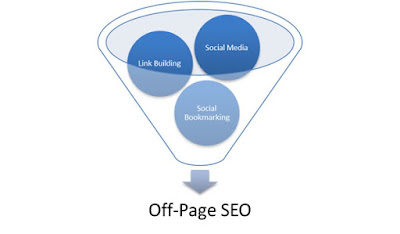on-page SEO and off-page SEO
Your search engine optimization strategy can be divided into two different categories: on-page SEO and off-page SEO. Both are crucial to the success of an SEO campaign, but they're on completely different sides of the fence when it comes to improving your search engine rankings.
1. On-page: what is your site about?
2. Off-page: how authoritative is your site? How popular is it?
On-page Search Engine Optimization
On-page optimization is about optimizing individual web pages in order to rank higher and earn more relevant traffic in search engines. On-Page SEO refers to how well your website’s content is presented to search engines. On page optimization involves ensuring whether a particular webpage is structured in a manner so that it gets found by the search engines for given keywords and key phrases. It not only helps in getting good search engine ranking but also increases overall readability of the site. The best part is that not much has changed about the on-page optimization approach. It can still be improved immediately by tweaking incorrect elements on a webpage.
1.Keyword selection
Each piece of content should be created keeping the focus primarily on a single keyword or a key phrase. This word or phrase should at least be mentioned for a specific number of times in the whole content and this process is known as keyword density. Each content copy is supposed to maintain a keyword density of 3-5% as par industry standard. Keep a mix of primary and secondary keywords and key phrases in your content but optimize your content around only those keywords and phrases on which you desire to achieve top organic search rankings.
2. Meta Description on tags
Meta data is a well written description summarizing the content of a particular webpage. It used to be one of the most important factors affecting search engine optimization in pre-Panda era. Meta data completely lost it’s importance in influencing Search Engine rankings from September, 2009 after Google’s declaration. It was majorly devalued because of a wide practice of spam techniques. Google crawlers though look at the Meta keywords to get an idea about the topicality of the page content. Meta descriptions have to be created within a limit of 155- 160 characters which essentially should not include anything but alphanumeric characters. It can’t influence search engine rankings but do help in getting a high click through rate.
Meta description works more as an ad copy for the organic search results which influences the readers to click on a particular link. It can also intelligently accommodate the primary keywords within it, Google specially highlights them if searched key phrase contains the exact key words.
3.Header tags
These are the tags which define the content of your page section wise, just like traditional headings and subheadings. There should be one <h1> tag every page, which should include the most relevant key phrase or key word. This tag can be created uptill <h6>, though general practice is to use this till <h3>.
Apart from the primary key word mentioned in the <h1>, you can include the other important keyphrases in <h2> and <h3> tags to define the other sections of the content. The <h1> tag should be optimized well as search engines still give this some value.
4.Title tags
Title tags are often used on search engine results pages (SERPs) to display preview snippets for a given page, and are important both for SEO and social sharing. The title element of a web page is meant to be an accurate and concise description of a page's content.
5.Interlinking
Strategically, linking one of your website pages to other similar pages on your website provides context to the search engine and to the readers as well. Some best practices are:
1.Include links in main content of each page.
2.Paragraph links carry the most weight.
3.Use keyword-rich anchor text in links.
4.Avoid using non-descriptive anchor text (for example, read more, click here, etc).
5.Link to relevant, deep pages.
6.Use breadcrumb navigation on every page
7.Monitor your inbound links through Google Webmaster Tools.
8.Avoid multiple links to the same page from a single page.
9.Less links= More authority per link.
The most common practice of showing “related links” or “tags” at the end of a page or in a
sidebar is done to thematically relate one page to another.
Off-page optimization
Off-Page SEO refers to your website’s overall “authority” on the web determined by what other websites say about your site. Off-page optimization is a long-term process and takes time to improve. Simply put, off page is all about your online reputation. Off page optimization includes acquiring back links to your page from the authority sites in your niche. Back links is the currency of any off-page strategy. And, unlike on-page optimization, off-page optimization efforts are not apparently visible on the webpage itself; it does the background work for a better search result. But, after the recent Google Panda and Penguin updates, off-page optimization scenario has drastically changed. Many effective old school practices became obsolete and negatively affected many big websites with high page ranks.Off page optimization effort can be grossly divided in two parts:
1.Link Building
Link building (alternative spellings include link building and link-building) refers to the process of getting external pages to link to a page on your website. It is one of the many tactics used in search engine optimization (SEO).
2. Social Media
Social media marketing and SEO are two tightly interwoven strategies. Both are organic, inbound strategies that focus on building an appealing identity that naturally attracts visitors. ... Unfortunately, when discussing how social media can influence your Google rankings, most search marketers leave out the details.


No comments:
Post a Comment